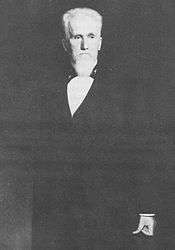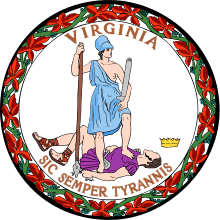Frederick W. M. Holliday
| Frederick W.M. Holliday | |
|---|---|
 | |
| 38th Governor of Virginia | |
|
In office January 1, 1878 – January 1, 1882 | |
| Lieutenant | James A. Walker |
| Preceded by | James L. Kemper |
| Succeeded by | William E. Cameron |
| Member of the Confederate States House of Representatives from Virginia | |
|
In office February 17, 1864 – March 18, 1865 | |
| Preceded by | Alexander R. Boteler |
| Succeeded by | Office abolished |
| Personal details | |
| Born |
February 22, 1828 Winchester, Virginia, U.S. |
| Died | May 29, 1899 (aged 71) |
| Nationality | American |
| Political party | Democratic |
| Alma mater | Yale University, University of Virginia |
| Profession | Lawyer, military officer, politician |
| Military service | |
| Allegiance |
|
| Service/branch |
Stonewall Brigade |
| Years of service | 1861–1864 |
| Rank |
|
| Unit | Company D, Mountain Rangers 33rd Virginia Infantry |
| Battles/wars | American Civil War |
Frederick William Mackey Holliday (February 22, 1828 – May 29, 1899) was a member of the Confederate Congress during the American Civil War and the 38th Governor of Virginia from 1878 to 1882.
Biography
Born in Winchester, Virginia, Holliday was the son of Dr. R.J. and Mary Catherine Taylor Holliday. He attended Winchester Academy and Yale University before earning degrees in philosophy, political economy, and law from the University of Virginia. He was the Commonwealth's Attorney for Frederick County, Virginia from 1861 to 1865.
During the Civil War, he served in the Stonewall Brigade in the Army of Northern Virginia. He began the war as the first captain of Company D, Mountain Rangers, of Winchester, which was part of the 33rd Virginia Regiment. During the Battle of Cedar Mountain, Holliday was wounded in his right arm, which then had to be amputated.[1] He resigned from the military as a colonel on March 1, 1864, and was elected to the Second Confederate Congress.
Holliday won the election for Governor of Virginia in 1877 as a Conservative Democrat unopposed. Holliday began his term by breaking the established tradition of small inauguration ceremonies for Virginia governors. His ceremony included parades, bands, cannons, and an inaugural speech given to some 10,000 people.
Holliday traveled the world after his term as governor. He died in 1899[2] and was buried in Mount Hebron Cemetery in Winchester, Virginia.
References
- ↑ Kric, Robert K. (1990). Stonewall Jackson at Cedar Mountain, p. 168. The University of North Carolina Press.
- ↑ The Indianapolis News
External links
- A Guide to the Executive Papers of Governor Frederick W. M. Holliday, 1878–1881 at The Library of Virginia
| Political offices | ||
|---|---|---|
| Preceded by James L. Kemper |
Governor of Virginia 1878–1882 |
Succeeded by William E. Cameron |

